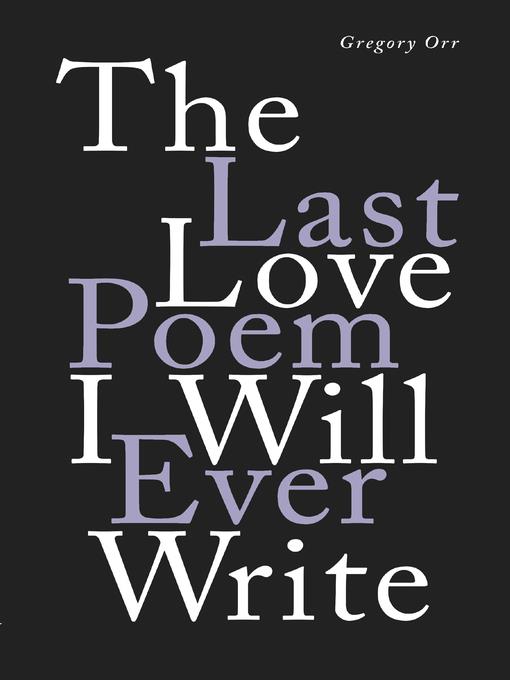
The Last Love Poem I Will Ever Write
Poems
کتاب های مرتبط
- اطلاعات
- نقد و بررسی
- دیدگاه کاربران
نقد و بررسی

June 24, 2019
At first plainspoken and clever, Orr (River Inside the River) pushes conceits until they are revelatory in this deceptively simple book. These are mostly short poems with a handful of several-page odes (to “Nothing,” “Some Lyric Poets,” “the Country of Us,” and “Left-Handedness”) in which Orr works through issues of belief (even as he declares he is “done with God”), love (even as he declares through the title poem that he’s written the last one on that subject), and trauma (even as he spells out that the coincidence of “Two boys, my father and I// Barely in their teens,/ Killing two others they loved/ By accident” isn’t “credible”). In “Ode to Nothing,” Orr plays with the word nothing: “Nothing is the secret force/ At the heart of it all” and “The wisest among us/Always believed in/ Nothing,” until it becomes a comforting entity. The gruffness rife in these poems gives way to love, which entered when Orr was “broken/ All the way to the center.” In this collection, he offers silence and language as a way to heal.

August 23, 2019
Veteran poet Orr (River Inside the River) here revisits themes that have shaped his writing from the beginning, examining the transcendent and finding it wanting compared with the here-and-now and especially the affirmative beauties of poetry. In a poem on his accidentally killing his brother in a hunting accident, an event that figures hugely in his life and work, he says exasperatedly, "Who knows what He was up to,/ ...I knew/ God and I were through," and he repeatedly throws down a challenge not just to some august deity but the very idea of one. The wise and witty word play-rife "Ode to Nothing" opens by pointing out that with atoms mostly empty "nothing holds/ The universe together," and of course he's talking not just physically but metaphysically. Elsewhere, he expresses impatience with the search for explanation or deep meaning, insisting that when "the world/ Suddenly turns ugly// ..."Don't waste time trying/ To understand, just fight/ For your life." But poetry? That's different; as Orr says in "Reading Dickinson," "Roar of the Abyss?/ Yes, but above it,/ Her clear/ And human voice,/ Singing as she drowns." VERDICT Orr will appeal to a wide range of readers as he asks big questions in accessible language.--Barbara Hoffert, Library Journal
Copyright 2019 Library Journal, LLC Used with permission.

June 1, 2019
Rather than the thing itself, the poem that entitles Orr's ample collection is a prospectus, not a conclusion. It announces several themes and images that any last love poem of Orr's will contain: an invention for turning ants' tears / Into hummingbird wings, the answer to the question ?Yes', glass slippers worn by the last queen of mice, the invisible cathedral built on the spot where we met ? all our joy and most of our sorrow. So doing, such a poem would attest Orr's large ambitions to conflate the magic constantly conjured by fairy tale, myth, and poetry with the rapture of personal love and the mystery of existence, human and natural. Those ambitions Orr has, of course, already reached for in the poems of this collection, of the remarkable River Inside the River (2013), and in earlier books. And in verse of astonishing verbal clarity?no polysyllabic scientific and philosophical trade vocabulary for Orr?and virtually invisible but adamantine technique, he achieves most of his aspirations. This is the work of one of our best poets.(Reprinted with permission of Booklist, copyright 2019, American Library Association.)

























دیدگاه کاربران